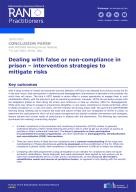Details
- Publication date
- 15 May 2023
- Author
- Directorate-General for Migration and Home Affairs
- Country
- Italy
- RAN Publications Topic
- Foreign Terrorist Fighters and their families
Description
With a large number of violent and extremist terrorist offenders (VETOs) to be released from prisons across the EU in the near future, their participation in distancing and disengagement interventions is desirable to the societies into which they will return. The time a VETO spends in prison offers a unique opportunity to engage them in such rehabilitation efforts, with the long-term goal of preventing recidivism.
However, VETOs do not always comply with the obligations placed on them along the prison–exit continuum or take up voluntary offers for disengagement. While some may refuse to engage in programmes altogether, in rare cases, compliance is merely performed, either to obtain concession or, in very rare cases, with the intention of harming prison staff. The goal of this RAN PRISONS Working Group meeting was to explore the scale and nature of false and non-compliance of VETOs in prison, to determine the implications for their risk and needs management and identify available interventions and strategies, lessons learned and current needs of practitioners in dealing with the phenomena.
The following key outcomes summarise the meeting’s overarching insights:
- Inmates’ compliance in the prevention and countering of extremism (P/CVE) context is generally understood beyond a VETO merely following the prison rules in order to get out of prison as quickly as possible or obtain preferential treatment. The focus is generally on their participation in/commitment to prison programmes, and more specifically in disengagement, deradicalisation and resocialisation (DDR) interventions.
- There are many forms of false and non-compliance and a common understanding of the scope and manifestations of these phenomena is yet to be developed among practitioners in the EU. While noncompliance is plainly visible, false compliance or deceptive behaviour is difficult to detect and address.
- Complying with DDR programmes (using participation as an indicator for compliance) does not equal successful rehabilitation. Social diagnostic and needs assessment tools applied by exit workers can be used more systematically and by a wider group of professionals, as they focus on the inmate’s rehabilitation needs and sources of protective factors, as opposed to only dealing with the security risks
- Case conferences and multi-professional panels are key when assessing compliance but require a lot of trust and joint trainings to deal with contradicting assessments or tensions between different professionals. Factors to consider are a ‘split image’ the inmate shows to different practitioners and the role of informal leaders and group dynamics, especially in concentration regimes.
- A combination of surveillance, dynamic security, and risk and needs assessment and management seem to be required when dealing with (potential) false or non-compliance. However, prison staff need to be aware of the limitations of each and develop an individualised approach with the inmate that is based on transparency and trust. Training of prison staff is crucial to become selfreflective on the practitioners’ role in the rehabilitation process, but also to gain awareness of religious, geopolitical and cultural factors in order to adequately recognise false compliance.

